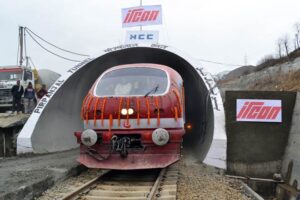The Udhampur-Srinagar-Baramulla Rail Link (USBRL) is a groundbreaking infrastructure project that significantly improves Jammu & Kashmir’s connectivity with the rest of India. The completion of the Katra–Sangaldan section marks the achievement of faster, year-round rail access to the Kashmir Valley.

About the Pir Panjal Railway Tunnel
- The Pir Panjal Railway Tunnel, also known as the Banihal Railway Tunnel, is currently India’s longest railway tunnel, stretching 11.2 kilometers in length.
- It is an integral part of the Udhampur-Srinagar-Baramulla Rail Link (USBRL) and connects Quazigund in the Kashmir Valley to Banihal in Jammu, passing beneath the Pir Panjal mountain range.
- As the only broad-gauge mountain railway tunnel in India, it forms part of the USBRL’s 202-km core segment.
- The Pir Panjal Range, located in the Lesser Himalayas, spans both Himachal Pradesh and Jammu & Kashmir.
- Notable peaks: Key peaks in this range include Indrasan (6,221 m) and Deo Tibba (6,001 m).
- Hydrological significance: The range acts as a watershed, separating the Beas and Ravi Rivers from the Chenab River, and is the origin of several tributaries of the Jhelum and Indus Rivers.
- Strategic passes:
- The Mughal Road crosses the Pir Panjal Pass (3,490 m), linking Poonch and Rajouri with Srinagar.
- The Jawahar Tunnel (2.5 km), under the Banihal Pass, connects Banihal to Qazigund.
- Tourism and history: The region is home to well-known tourist spots like Gulmarg and historically served as an ancient trade route connecting Kashmir to mainland India.




